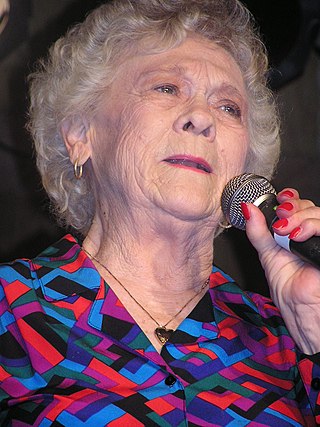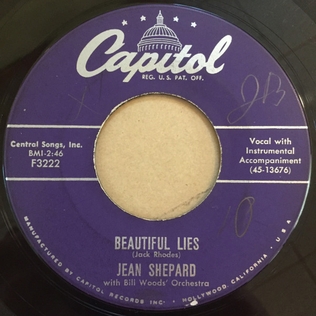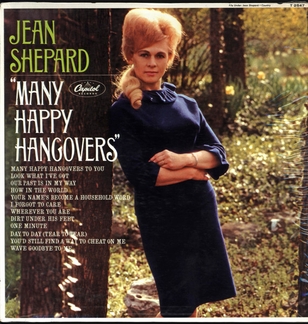
Jean Shepard was an American honky-tonk singer who is often acknowledged as a pioneer for women in country music. Shepard released a total of 73 singles to the Hot Country Songs chart, one of which reached the number-one spot. She recorded a total of 24 studio albums between 1956 and 1981, and became a member of the Grand Ole Opry in 1955.

The discography of American country singer Jean Shepard contains 29 studio albums, 12 compilation albums, two live albums, 1 box set album, 72 lead and collaborative singles, four promotional singles, two other charted songs and nine album appearances. Her first singles were released by Capitol Records in 1953, beginning with "Crying Steel Guitar Waltz". Her next two releases featured vocals by Shepard and a recitation by Ferlin Husky. The first was "A Dear John Letter", Shepard's only number one single on the US Hot Country Songs chart. It also reached number four on the US pop chart and number three in Australia. The second was "Forgive Me, John", which reached the US country top five, the US pop top 30 and the Australia top 20. In 1955, her solo singles "A Satisfied Mind" and "Beautiful Lies" both reached number four on the US Hot Country Songs chart. Their B-sides also charted on the US country chart: "Take Possession" and "I Thought of You". The latter peaked in the US country top ten.

"Beautiful Lies" is a song written by Jack Rhodes and recorded by American country singer Jean Shepard. It was released in September 1955 by Capitol Records as a single. It became Shepard's fifth top ten single on the US country chart in her career and was given positive reception by critics.

"I Want to Go Where No One Knows Me" is a song written by Kenneth Grant and Jerry Jericho. It was originally recorded by American country singer Jean Shepard. Released as a single in 1958, it reached the top 20 of the US country chart.

"Second Fiddle (To an Old Guitar)" is a song written by Betty Amos that was originally recorded by American country singer Jean Shepard. It was released as a single by Capitol Records in 1964, reaching the top five of the US Country chart. The song featured Shepard yodeling and was her first top ten single in ten years. The song would later be nominated by the Grammy Awards.

"Many Happy Hangovers to You" is a song written by Johnny MacRae that was originally recorded by American country singer Jean Shepard. It was released as a single by Capitol Records in 1966, reaching the US country top 20 that year. It received a positive review from Billboard magazine following its release and was included on her 1966 studio album of a similar name.

"If Teardrops Were Silver" is a song written by Don Wayne that was originally recorded by American country singer Jean Shepard. It was released as a single by Capitol Records in 1966, reaching the US country top ten that year. It received positive responses from Cashbox and Record World magazines. It was included on her 1967 studio album of a Heart, We Did All That We Could.

"Heart, We Did All That We Could" is a song written by Ned Miller that was originally recorded by American country singer Jean Shepard. It was released as a single in 1967 and reached the top 20 of the US country songs chart. It received positive reviews from music publications was included on Shepard's studio album of the same name. The song has been performed routinely in the Country Bear Jamboree entertainment attraction at Walt Disney World.

"Your Forevers (Don't Last Very Long)" is a song originally recorded by American country singer Jean Shepard. It was written by Wes Buchanan, Cliffie Stone and Scott Turner. Released as a single by Capitol Records in 1967, it reached the top 20 of the US country songs chart. It received a positive review from Cash Box magazine and appeared on a studio album of Shepard's with a Your Forevers Don't Last Very Long.

"I'll Take the Dog" is a duet song by American country singers Jean Shepard and Ray Pillow. Released as a single, it reached the top ten of the US country songs chart in 1966. The song was described as a "comedy duet" centered on a couple about to divorce. It received a positive response from Record World magazine following its release and was included on the pair's album of the same name.

The Best of Jean Shepard is a compilation album by American country singer Jean Shepard. It was released in September 1963 by Capitol Records and was her second compilation released in her career. The album featured 12 tracks, four of which were top ten singles on the US country chart: "A Dear John Letter", "Forgive Me, John", "A Satisfied Mind" and "Beautiful Lies". The compilation received positive reviews following its release.

Many Happy Hangovers is a studio album by American country singer Jean Shepard. It was released in July 1966 by Capitol Records and contained 12 tracks. The album's concept was centered on songs about an evening out followed by songs about the morning after. Among them was the album's title track. Released as a single, it reached the top 20 of the US country chart in 1966. The album was given a positive reception by Billboard, Cashbox and AllMusic.
"Have Heart, Will Love" is a song written by Sid Tepper and Roy C. Bennett. It was originally recorded by American country singer Jean Shepard. Released as a single in 1959, it reached the top 30 of the US country chart.

I'll Take the Dog is a studio album by American country artists Jean Shepard and Ray Pillow. It was released in November 1966 by Capitol Records and was a collection of duets between the duo. The album's songs focused on marital conflicts and other themes. Its title track was a top ten single on the US country chart in 1966. The album itself reached the top 20 of the US country chart. The album was met with positive reviews from Cash Box and Record World.

Heart, We Did All That We Could is a studio album by American country singer Jean Shepard. It was released in March 1967 by Capitol Records and featured 12 tracks. The album's material centered on heartbreak and despair. Six of the tracks were originally singles released between 1963 and 1967. Both "Second Fiddle " and "If Teardrops Were Silver" reached the US country top ten, while the title track reached the top 20. The album itself reached the US country top ten in 1967. The disc received positive reviews from both Billboard and Cashbox.
"A Tear Dropped By" is a song originally recorded by American country singer Jean Shepard. Composed by Larry Lee and Rusty Adams, it was released as a single in 1964, reaching the top 40 of the US country chart that year. It was one of 30 top 40 singles Shepard had in her career. It was given positive reviews from critics following its release.
"Someone's Gotta Cry" is a song written by Don Bowman that was originally recorded by American country singer Jean Shepard. It was released as a single in 1965, reaching the top 40 of the US country chart that year. It was one of 30 top 40 singles Shepard had in her career. It was given positive reviews from critics following its release.

Your Forevers Don't Last Very Long is a studio album by American country singer Jean Shepard. It was released in September 1967 by Capitol Records and consisted of 12 tracks. The album was both a collection of new recordings and cover tunes. Of the new recordings was the album's only single "Your Forevers ". The title track reached the top 20 on the US country chart in 1967. The album itself also reached the US country top 20 and received a positive review from Cash Box magazine.

Heart to Heart is a studio album by American country singer Jean Shepard. It was released by Capitol Records in February 1968 and contained 12 tracks. The album's material mixed ballads with uptempo material. Many of the album's songs were cover tunes. Its lead single was "I Don't See How I Can Make It", a top 40 entry on the US country chart. The album received positive reviews from publications following its release. It was the eleventh studio album in Shepard's career.
"I Don't See How I Can Make It" is a song written by George Richey that was originally recorded by American country singer Jean Shepard. Released as a single in 1967, it reached the top 40 of the US country songs chart.
















